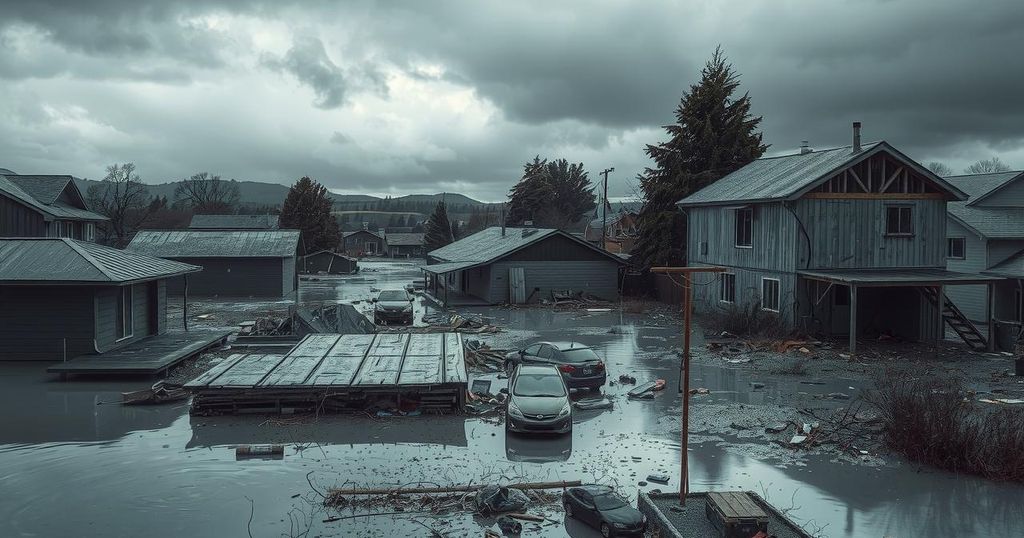Liberia Flood Victims Demand Accountability and Aid Six Months Later

Residents of flood-stricken River Cess County in Liberia express anger and abandonment, claiming that promised aid has not arrived six months after the disaster. Allegations of misappropriation of aid by local Disaster Agency officials have emerged. Experts warn that the government must do more to combat climate change and improve disaster preparedness to avoid further crises.
In River Cess County, communities affected by last year’s devastating floods face ongoing despair, feeling abandoned by their government. The floods obliterated homes and led to significant property damage while local officials promised humanitarian aid that reportedly never arrived. Numerous residents allege that aid meant for them was misappropriated by Disaster Agency officials.
Mohammed Keita, a local farmer, expressed his frustration, stating, “I was highly affected and up to now, no response, no concern from the Liberian government, neither our county authorities.” Local leaders, such as Senator Bill Twehway, have claimed that aid, including bags of rice and cooking oil, was sent but never reached the survivors, heightening their sense of betrayal.
Community members like Mahyeadeh Zar reported seeing aid supplies unloaded and sold by Disaster Agency agents as they passed through local villages. Ansu Dulleh, the head of Liberia’s Disaster Management Agency, has pledged to investigate these serious allegations of misappropriation, stating, “We will do an immediate investigation to see where the issue comes from.”
Only minimal assistance has reached those affected, with some residents receiving financial aid from the Catholic Justice and Peace Commission. As the rainy season approaches, they remain desperate for food and assistance to rebuild their lives. Keita lamented the loss of his home and livelihood, now struggling to survive through charcoal burning.
Experts emphasize the urgent need for government action in addressing climate change and improving disaster preparedness. Climate-related disasters have dramatically increased, affecting tens of thousands of Liberians, as noted by the Liberia Disaster Agency. If unaddressed, climate change may severely impact the nation’s economy and exacerbate poverty.
Environmentalists criticize the lack of enforcement of regulations against building in flood-prone areas and highlight the detrimental effects of deforestation on natural water absorption. Sampson Williams remarked on the inaction of the government, stating, “Nationally, I don’t think that the government is doing much to reduce the impact of climate change on its people.”
Despite the visible signs of destruction, such as damaged homes and infrastructure, residents continue to endure as they navigate the consequences. Princess Nanna described her struggles in Glanyah, where access to safe drinking water is limited. “I didn’t receive anything from them. I’m really disappointed,” she said, echoing the sentiments of many.
The need for governmental intervention extends beyond basic assistance; there is a critical need for public education on environmental protection to prevent future disasters. Jerome Nyenka expressed the importance of awareness, calling for a campaign to inform communities about the implications of constructing on vulnerable land. Amidst this turmoil, voices like Keita’s demand realistic solutions and meaningful change rather than mere promises, underscoring a pervasive sense of abandonment in the wake of disaster.
The ongoing struggles faced by flood victims in River Cess County illustrate a systemic failure in disaster response and climate preparedness. Residents feel neglected as relief aid remains elusive, and allegations of corruption further compound their challenges. Experts call for immediate action to address climate change and enforce regulations that protect vulnerable communities. The voices of the affected demand accountability and substantial support from the government, emphasizing the urgency of these issues in preventing future crises.
Original Source: frontpageafricaonline.com







